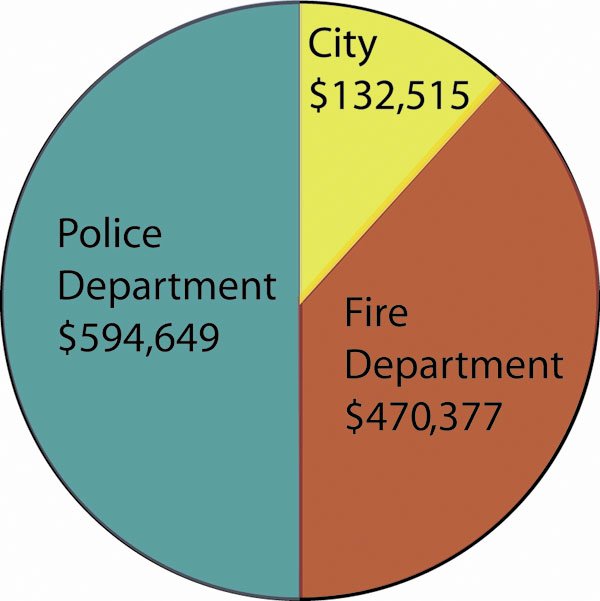Gilroy
– Firefighters and police officers accounted for nearly 90
percent of the city’s $1.19 million in overtime expenses in 2004,
with the vast majority of recent increases due to minimum-staffing
requirements for the fire department, according to figures recently
disclosed by city officials.
Gilroy – Firefighters and police officers accounted for nearly 90 percent of the city’s $1.19 million in overtime expenses in 2004, with the vast majority of recent increases due to minimum-staffing requirements for the fire department, according to figures recently disclosed by city officials.
Overtime expenses for the 36-member fire department have spiked since 2000, when binding arbitration led to a four-firefighter minimum on each engine. The change meant the city could no longer rely on case-by-case “call-backs” to fill vacancies due to injuries or departures.
City Administrator Jay Baksa calculates that the minimum-staffing requirement accounted for 65 percent, or $364,000, of the fire department’s projected $560,000 overtime bill for the current fiscal year. In fiscal 2003-2004, the figure stood at 34 percent.
“That 65 percent is mandatory, unless we violate the law,” Baksa said. He stressed, however, that the cost of increased overtime is offset “dollar for dollar” by savings on departmental salaries and benefits.
Trimming the city budget has become a top priority for officials who warn of the potential for major program cuts in the near future. The city and fire union recently declared impasse in labor negotiations in part because city leaders demanded a roll-back of the minimum-staffing requirement, the biggest potential area for savings in the department’s overtime budget.
For the current fiscal year the overtime figures also include:
• 22.9 percent for training
• 7.6 percent for special projects, such as serving extra hours as emergency operations coordinator
• 2.1 percent for emergency call-backs
“We could reduce the amount of time we have (firefighters) do specific projects for us, which is counter-productive because somebody’s gotta do that stuff,” Baksa said. “The other thing we could control, to some extent, is we could stop training.”
Police Sgt. Kurt Svardal questioned the wisdom of cutbacks in training, which he likened to an “insurance policy” for officers and the public.
“We have things we have to do,” Svardal said. “We don’t have a choice. Training is a prime example. If you don’t train at all and something goes awry, you’re going to get sued. Some costs you’re going to have no matter what.”
In contrast to the spikes in the fire department’s overtime budget, the police have shown a gradual increase in their use of overtime. The department’s overtime budget has risen from $349,370 in fiscal 1999-2000 to a projected $513,366 for the current year. Any police agency inevitably faces some overtime, Svardal said, due to court appearances, parole hearings and other mandatory duties.
Where possible, the department has tried to rein in spending, Svardal added. For instance, police have combined into one day their firearms and defensive-tactics training, which once involved separate five-hour blocks.
“We always are looking at ways to try and be efficient,” Svardal said.
The city also faces certain inescapable overtime expenses, according to Human Resources Director LeeAnn McPhillips.
“Culturally, there are certain departments we have to staff a certain way,” she said. “The corporation yard for example, there are times the maintenance workers will work overtime when there’s a water main break.”
According to city figures, maintenance workers accounted for nearly $50,000 in overtime in 2004, the largest share of the city’s $132,515 in total overtime. The job category of “technician,” which spans numerous departments in City Hall, earned a combined $31,388 in overtime, followed by two of three planners who combined for more than $18,000.
Officials released city-wide wage figures earlier this month, listed by position and without names, in response to a Public Records Act request by the Dispatch. The information was also distributed to employees and councilmen, who have scheduled a May 16 workshop to review the Gilroy Fire Department’s overtime figures. The discussion could inform future debate on a possible ballot measure to eliminate binding arbitration, which city leaders feel has tied their hands at an especially sensitive time.
Officials have warned that residents face a gradual decline in services in coming years as budget reserves dwindle, despite a freeze on new hiring through 2010. Councilmen have compiled an extensive list of potential cuts in anticipation of renewed state raiding of local taxes, a slump in the local economy or some other budget-busting scenario. The list of cuts range from eliminating Fourth of July fireworks to closing the senior and youth centers.
Svardal could not say where the police department would cut back if budget fears materialize.
“That’s what the politicians are for,” he said. “It’s a matter of prioritizing. It’s a very touchy situation.”














